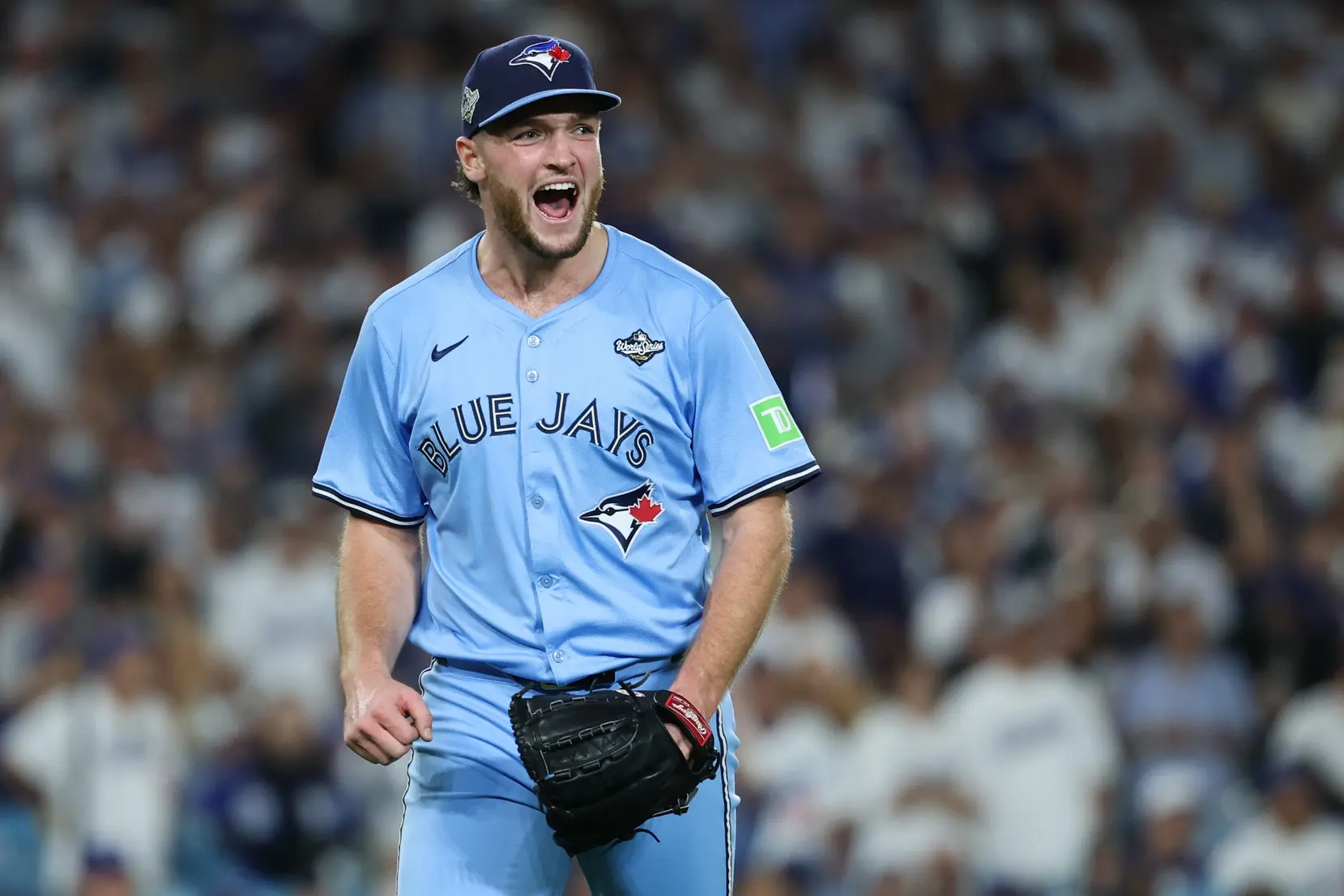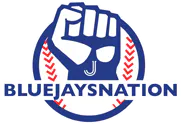Trey Yesavage gets a massive ovation after 5.2 IP! 🎥: Sportsnet | #BlueJays
It’s not urgent, but the Blue Jays should consider signing Trey Yesavage to a contract extension this offseason

Photo credit: © Kiyoshi Mio-Imagn Images
Nov 5, 2025, 19:50 ESTUpdated: Nov 5, 2025, 19:49 EST
The Toronto Blue Jays had one of the best prospect stories of 2025 with right-hander Trey Yesavage.
A first-round pick in 2024, Yesavage debuted in Single-A Dunedin earlier this year and bullrushed his way to the big leagues, striking out numerous opponents along the way. He made 25 appearances (22 starts) in the minor leagues before taking the mound for the Blue Jays in September, where he started three games before October rolled around. In the postseason, Yesavage was one arm that manager John Schneider leaned on to get strikeouts and provide a fresh face that opponents hadn’t seen before on the game’s biggest stage.
He had two outings that stood out in this most recent postseason run, the first being his ALDS start against the Yankees, where he went 5 1/3 innings and didn’t allow a single hit on 78 pitches. He had just one walk and 11 strikeouts to his credit before he was pulled with the no-hitter still intact. The second outing was his second start of the World Series, taking the mound for Game 5 on the road in Los Angeles. He held the Dodgers’ bats to just three hits, one earned run, and one walk while striking out 12 in the eventual win.
It was an impressive debut for Yesavage, who used his plus fastball and splitter to generate a ton of whiffs with his over-the-top arm action. Not only did he take the world by storm in the minor leagues, but he’s a draft success story for a Blue Jays organization that desperately needed a pitcher to emerge and take a stranglehold on a rotation spot. Because of his play, Yesavage should be pencilled in for a rotation spot next season.
This begs the question: Is Yesavage a player that the Blue Jays should lock up now to avoid future arbitration processes?
It’s a valid question, and before ‘the Jays need to sign Bichette first‘ comments start flooding in, I understand that extending Yesavage should not be the number one priority out of the gate for Ross Atkins and the Jays front office.
They already generated an early win when Shane Bieber opted to stay with the organization for another season, but there is still work to be done to create a squad that wants to head back to the World Series in 2026. Bo Bichette is a free agent that the club should re-sign; the rotation should add another arm, and the Jays’ bullpen could use a few more arms as well. I understand that a Yesavage extension isn’t at the top of the list.
However, let’s kick the tires on this scenario to see why it may (or may not) make sense.
Looking at his current contract projection per FanGraphs, Yesvaage is under pre-arbitration until 2029 and won’t be free agent eligible until 2032. For a starter of his calibre, to be making just the bare minimum ($820,000 by MLB standards) until closer to the end of this decade is a win for the Jays’ payroll, especially if the club wants to go fishing in the deep end this winter and beyond.
Trey Yesavage has set an MLB record with the most strikeouts by a rookie pitcher in a World Series game! Unbelievable! 🎥: Sportsnet | #BlueJays
However, it is becoming a more common place tactic in today’s game to lock down top prospects with zero or limited big league experience to multi-year deals. The goal is to keep arbitration figures in mind down the road, but reward the player with guaranteed money before they are eligible for free agency (and after in some cases).
A recent example is Boston Red Sox infielder Kristian Campbell, who inked an eight-year deal worth $60 million very early into his career. Instead of going through pre-arbitration and arbitration with Campbell, the Red Sox presented the prospect with guaranteed money that has him earning more through his pre-arb years, while negating the arbitration process between the two sides by having this contract in place. The money is more lucrative for the player early on in their career, while the organization gains some additional years of control with a contract of this nature going past when Campbell would be eligible for free agency (and in this case, a couple of club options to work with as well).
The Red Sox aren’t the only club to use this tactic, although they did also employ it with Roman Anthony (eight-year, $130 million), but players such as Fernando Tatis Jr. (Padres), Colt Keith (Tigers), Jackson Chourio (Brewers), and Samuel Basallo (Orioles) are all varying examples of prospects or players with limited big league experience signing long-term contracts to earn guaranteed money and leave less to chance in arbitration or early free agency.
In discussing a potential contract for Yesavage, it should be noted that all the examples provided above are position players, as there is a fair argument that pitchers carry a bit more risk when it comes to early success translating into something more long-term. There is a possibility that teams adjust to Yesavage over the coming years, and this early dominance Jays fans are seeing evaporates in just as quick of succession as it arose. One would like to think that’s not the case, given that Yesavage will likely adjust back, but there will always be a risk with signing a prospect/younger player to a long-term deal. Ask Tampa Bay Rays fans about how those types of deals sometimes go the wrong way fast, although, in their case, it was issues off the field that created problems between team and player versus performance on the field.
There will be some risk associated with signing Yesavage to guaranteed money, but there is also a ton of positive outcomes that can be generated if the 22-year-old continues to build upon his early success with the Blue Jays.
For one, it switches the narrative that the Jays missed with when it comes to previous top prospects in Vladimir Guerrero Jr. and Bo Bichette, with one signed to a long-term deal a year before free agency and the other currently on the verge of testing the open market. A deal of this nature also avoids the team and player from having to go to future arbitration hearings, taking that process out of the equation, one that has been known to strain the relationship between both sides. On top of these notes, it should also be in the back of the front offices’ minds that when the CBA expires following the 2026 season, a potential lockout is on the horizon while the owners and union hammer out their issues, leaving players and their contracts in a potential flux if games are missed.
Trey Yesavage is entering the ballgame in the top of the 7th inning! 🎥: Sportsnet | #BlueJays
Overall, a contract of this nature doesn’t have to be solved tomorrow, and if the Jays front office were to kick the tires on this, I would imagine it would be a conversation for the new year, closer to spring training. A deal of this nature can take so many varying angles and degrees, so to speculate anything would just be like throwing jello at the wall. Yesavage would still earn an amount that is closer to pre-arb over the next few seasons (think $1-3 million area), and that number would gradually increase over time as the right-hander would be hitting those contract benchmarks.
If Toronto’s front office wants to hop on board the recent trend of locking down rising stars to long-term guaranteed deals, Trey Yesavage is a good place to start. The right-hander dominated his way through the minors, wasn’t fazed by the bright lights in the postseason, and has the potential to be the face of this organization’s rotation for the foreseeable future, regardless of whether a guaranteed contract is signed or not.
PRESENTED BY VIVID SEATS
Take $20 off your first Vivid Seats order of $200+ using promo code JAYSNATION (new
Breaking News
- Blue Jays Nation’s Top 25 Canadian Baseball Prospects for 2026: #2 Jonah Tong
- Blue Jays Nation’s 2026 Pre-Season Prospect Countdown – No. 20: Grant Rogers
- Blue Jays Nation’s 2026 Pre-Season Prospect Countdown – No. 21: Adam Macko
- Blue Jays Nation’s Top 25 Canadian Baseball Prospects for 2026: #3 Dante Nori
- Blue Jays’ Eric Lauer will start 2026 Grapefruit League opener

